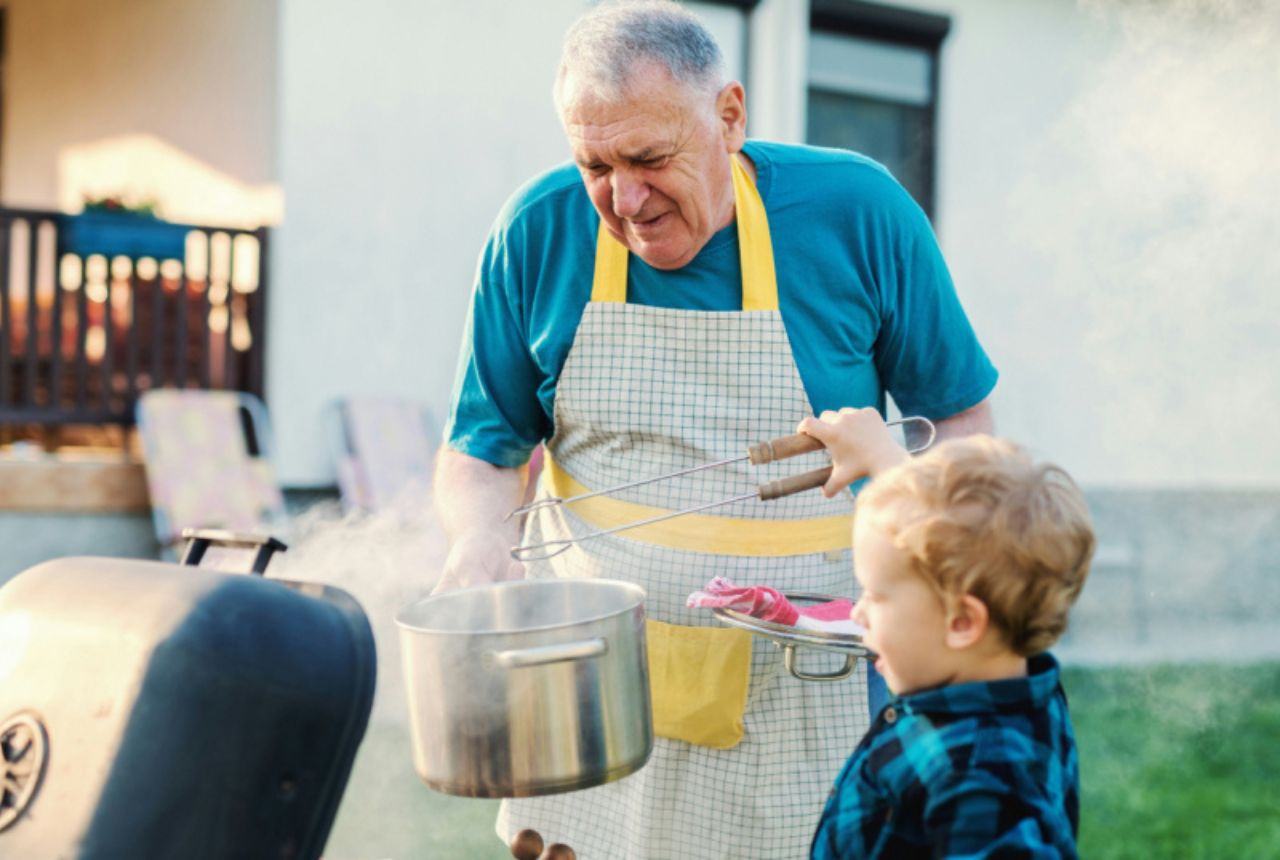I’ve always been fascinated by how different generations express love.
Growing up, my parents—both born in the 60s—were anything but gushy about their feelings. They rarely said “I love you” outright. Yet, there was no doubt in my mind that they cared deeply.
The older I get, the more I notice that this subtle, often understated way of showing affection is common among many people who came of age during that decade.
If you have friends, family members, or even co-workers born in the 60s, you might have picked up on these quiet displays of affection too.
Maybe it’s the way they’ll slip you a piece of homemade cake wrapped in foil “just because,” or how they’ll offer practical help when you least expect it. Over the years, I’ve learned to recognize these little signals of love and appreciate them for the heartfelt gestures they truly are.
Below are eight such ways people from that era tend to show they care—without ever uttering the words.
Let’s dive in.

1. They offer practical support when it matters most
When my washing machine broke down a couple of years ago, the first person to show up at my door was my godmother.
She didn’t bring chocolates or a sympathy card—she came armed with a toolbox, an extra set of towels, and her signature no-nonsense approach. Within an hour, she’d diagnosed the problem, set me up with a temporary solution, and told me to stop apologizing for the mess.
That’s the thing about folks born in the 60s: they often show their care by helping in very practical, down-to-earth ways.
It’s rarely flashy, and they won’t always explain it as an act of love. But when you’re facing a challenge, they’ll roll up their sleeves and get to work.
Whether it’s mowing your lawn when you’re swamped, babysitting at short notice, or fixing your leaky faucet, they demonstrate affection through actions rather than words.
From my perspective, it’s one of the best gifts you can receive. If anything, it reminds me of the famous quote by Sheryl Sandberg, who said, “Done is better than perfect.”
In other words, they don’t fuss about making a grand statement; they focus on stepping in and making things better, right here and right now.
Get Smarter Everyday Join Us On WhatsApp
2. They stay loyal through thick and thin
I’m sure you’ve heard the phrase “ride or die.” People born in the 60s practically invented it—although they’d never describe it in such modern slang.
Their loyalty runs deep, whether it’s to their favorite sports team or lifelong friends. They keep the same social circles for decades, and once you’re part of their inner circle, it’s like being adopted into an extended family.
This loyalty can appear in small gestures. A friend’s mother (also born in the 60s) always sends me a birthday card with a personal note, despite living hundreds of miles away.
We haven’t spent a holiday together in years, but she’s steadfast in remembering these special occasions.
That sort of unwavering loyalty often comes from the era’s emphasis on community and sticking together.
As a result, they may not proclaim their love with flowery language, but they’ll be there when you need them—no questions asked.
3. They cook, bake, and feed you…a lot
Food is arguably the universal language of love, but people who grew up in the 60s have it down to a fine art.
If they cook for you, it’s a sure sign they care. My father would spend hours preparing Sunday roasts—complete with crispy potatoes and homemade gravy—and it was his way of bringing everyone together and showing affection.
Sometimes, it’s even more subtle than that. A colleague of mine (also from that generation) keeps a small jar of homemade jam in her desk, ready to hand out whenever someone looks like they need a pick-me-up.
She doesn’t make a big deal out of it—she just quietly places it on your desk and says, “I had some extra.”
It might not sound like a grand romantic gesture, but it speaks volumes about how they feel.
After all, feeding someone is deeply nurturing, and it’s a timeless, comforting way to show you’re looking out for them.
4. They remember details you forgot you ever mentioned
Have you ever had an older friend bring up something you told them in passing, months or even years later?
Maybe you mentioned you loved a certain type of candy or a specific author. Then, out of nowhere, they surprise you with that very thing.
Get Smarter Everyday Join Us On WhatsApp
People born in the 60s—especially those who are particularly caring—tend to have this amazing ability to store little details. It can catch you off guard. You might have thought you were just rambling about a random topic, but they were listening closely.
This form of love is quiet but profound. It tells you, “I’m paying attention to what you say. Your interests matter to me.” In a world so full of digital noise and distractions, that level of attentiveness is like a warm hug.
5. They prioritize face-to-face connection
I can’t count how many times I’ve tried to schedule a quick phone call or video chat with an older family member, only to have them insist on meeting in person.
“When can I see you in real life?” they’ll ask, clearly perplexed by the idea of having a heart-to-heart conversation through a screen.
This stems from a generation that grew up without text messages and social media. They’re used to (and prefer) real-world, tangible interactions.
For them, showing up physically is how you show you care. It might mean driving an hour to see you for a 20-minute coffee or stopping by to check on you after a tough week.
There’s no explicit “I love you,” but you feel it in their presence.
6. They give ‘tough love’ when you need it most
I’ll be honest: this one used to drive me crazy. I remember being 18 and desperately wanting a pep talk when I messed up in my first job.
Instead, my aunt (born in 1965) gave me a serious talking-to about responsibility and consequences. It wasn’t exactly the warm hug I wanted, but it was the harsh wake-up call I needed.
Now I see it for what it was—love, wrapped in realism. “Tough love,” as it’s often called, has its roots in the idea that caring for someone sometimes means telling them hard truths.
People from that era grew up in a time when independence and accountability were highly valued. Their version of nurturing often involves giving you a nudge (or a shove) in the right direction.
John C. Maxwell once noted, “People may hear your words, but they feel your attitude.” That’s the essence of tough love. Even if the words come out stern or abrupt, the underlying attitude is one of genuine care—they want to see you grow and thrive.
7. They share stories and lessons learned (even if it feels like advice overload)
I can’t count how many times my dad has started a conversation with, “When I was your age…” or “Back in my day…”
Although it used to make me roll my eyes, I’ve come to understand that he’s not just reminiscing—he’s sharing wisdom he believes could help me navigate life’s challenges.
Get Smarter Everyday Join Us On WhatsApp
In my own journey, I’ve found these anecdotes surprisingly useful. They offer a glimpse into the experiences that shaped our parents, uncles, aunts, or older friends.
Yes, it might sound like unsolicited advice sometimes, but if you look closer, you’ll see it’s brimming with the kind of hard-earned lessons that come with living through many ups and downs.
This storytelling approach is, in its own way, an act of love. They’re hoping you’ll avoid the mistakes they made or gain insight they wish someone had given them at your age.
8. They quietly check in—often without you noticing
Have you ever realized, months later, that an older friend or relative was subtly checking up on you the whole time?
It might show up in how they casually call to see “if you got home safely,” or how they’ll comment on a social media post you made about feeling stressed, saying “Just making sure you’re all right!”
They’re not the type to bombard you with texts or gush about how they worry. Instead, it’s more understated.
They might appear at your doorstep with groceries if they heard you were feeling under the weather, or send you a random email asking, “Do you still need help with that project?”
Stephen Covey famously said, “Most of us spend too much time on what is urgent and not enough time on what is important.” People in this generation seem to flip that.
Their quiet check-ins focus on what’s truly important—your well-being—even if it doesn’t look urgent on the surface. And that, in my eyes, is a profound act of love.
Wrapping up
It’s easy to overlook these subtle gestures, especially when we’re used to equating love with flowery words and public displays of affection.
But individuals born in the 60s have their own brand of showing they care—one grounded in practicality, loyalty, and genuine concern for your day-to-day life.
Maybe you can think of someone right now who fits this description: an older friend, relative, or neighbor who shows up for you in a quiet but powerful way.
Take a moment to appreciate how these gestures have likely shaped your life, even if they’ve never once said, “I love you.”
Over the years, I’ve grown to understand and cherish these subtle expressions of care. And, as I remind my son, you don’t have to hear the words to know someone truly loves you.
Get Smarter Everyday Join Us On WhatsApp
By the way, you might have read my post on the power of unspoken support in relationships, where I share a few more ideas on how nonverbal cues can strengthen our bonds.
Here at DM News, we’re all about celebrating the different ways we connect with each other—whether it’s through a handwritten letter, a home-cooked meal, or a subtle act of kindness that speaks louder than any declaration.
At the end of the day, love is everywhere, especially where we least expect it.
All we have to do is pay attention.
Recommend Reading:
- 8 Things Boomers Do That Make Younger People Feel…
- 10 Signs That Someone Can’t Stop Thinking About You,…
- 7 Things Boomers DO That Actually Make Them…
- 7 Habits to Say Goodbye to If You Want to Spend More…
- 10 Subtle Signs You're An Intelligent & Self-Aware Outcast
- 11 Signs You're Mentally Sharper Than An Average Person










